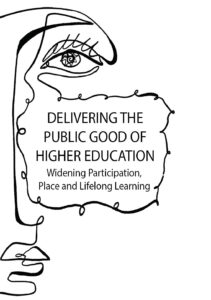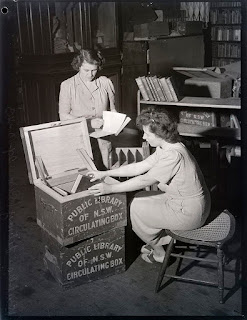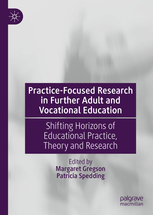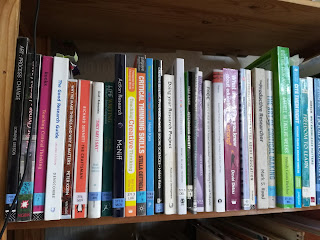very excited to announce I have a chapter published in this book © 2022 Access and Widening Participation in Arts Higher Education Practice and Research Editor: Samantha Broadhead One of the few books to address Access and WP from an arts practitioner perspective. Builds on previous work in Access and WP from a perspective that is contextualized in the current political climate. Covers policies and practices that impact on inclusive and diverse art
Posts
- Get link
- Other Apps

At ADEMA Arts School in Palma, Majorca giving a paper during Art Week March 2022 · https://www.ademaescuelauniversitaria.com/ https://semanainternacional.ademaescuelauniversitaria.com/ponentes-art-week/ https://www.ademaescuelauniversitaria.com/nueve-universidades-internacionales-de-bellas-artes-se-dan-cita-en-la-i-art-week-de-adema/
- Get link
- Other Apps

So excited for this publication, thanks to the editing team for pulling this publication together despite the pandemic. Here is a short extract to be found at: https://drive.google.com/file/d/1LebIznHs5AekPU6dnuwZaemCB9j3hpQ1/view What can critical thinking do for access to higher education adult learners at a further education art institution? Reflections on a poetry group Frances Norton (frances.norton@leeds-art.ac.uk) Leeds Arts University, UK Introduction Although art students would prefer to make and create with their hands rather than write using thinking skills (Somerson and Hermano, 2013), nevertheless using a poetry group as a pedagogic intervention could help participants become more motivated to write because Lipman (2010) states when students engage in dialogue and collaboration they also participate in critical, caring and creative thinking. The purpose of this research is to discuss the importance of criticality and independent thinking for lifelong and WP students, and
- Get link
- Other Apps

Positive feelings about writing? It seems to me it is critical thinking and writing together that go to make up good thoughtful writing. The thing about writing is that there are many reasons for writing. In my art school education we were taught how to write a biography for art shows and application forms for funding bids. How to think about a project we wanted to make and write a proposal for it. The writing had a practical purpose and described practical actions. I found abstract theoretical writing harder. At A level, I was very motivated by my studies in theology. Our problem was in the 1980s no internet to look stuff up and no contemporary journals to help our essays. No contemporary writing on theology in the reference library we used to frequent and the dusty old books there written over a thousand years ago some of them. Jerome and Peake. Phew. Now when I think about research I begin with the internet and quickly deep dive into the academic library catalogue at our
- Get link
- Other Apps

Common elements in my negative feelings about writing Oh wow its not often I can go on a moan fest, let it rip, and let it all out. Negative feelings about writing. Doubt – I’m not good enough to do this, I’m not expert enough in the field of academic writing. I had the wrong training in art and design with a bit of academia tacked on the end so I fee unprepared. This critical incident vignette demonstrates the beginning of negativity towards writing. Sitting on the scratchy coconut matting in primary school, in our class we had glass jars of things to count, beads, dog biscuits, ect. Of course, I ate a dog biscuit, it was really dusty and stale. I had decided to be silent that year. In class 4, making me about 7. I had decided that grown-ups were stupid. They asked ridiculous question that I couldn’t answer like “why can’t you tell the time” or “have you got a smile for us love?” “what’s going on in that head of yours?” I decided the best policy was elective mutism. That way I could
- Get link
- Other Apps

So excited to see my chapter in print this summer. Publishing work is a long and archaic process, it feels medieval in its venerable qualities. https://www.amazon.co.uk/Practice-Focused-Research-Further-Vocational-Education/dp/3030389936/ref=sr_1_1?dchild=1&keywords=practice+focused+research&qid=1599745167&s=books&sr=1-1 Chapter 7 : Developing Critical Thinking and Professional Identity in the Arts Through Story. By Frances Norton. Extract from Chapter 7 Brown (1998, p. 189) states that the idea of educating students in an atmosphere of equality and joint inquiry could maximise each student’s access to the legacy of the critical traditions might at first appear to be a high risk strategy. He goes further describing critical thinking interventions in education as an invitation to classroom disorder. Positive, creative, fruitful disorder is what I was hoping for when I embarked on this research journey. Close reading of the ideas of Lipman (2003) reveals that he tur
- Get link
- Other Apps

Belcher, W. L. (2019) Writing Your Journal Article in Twelve Weeks, Second Edition: A Guide to Academic Publishing Success (Chicago Guides to Writing, Editing, and Publishing), Chicago and London: Chicago University Press. I have just begun reading and thinking about this book. I love a workbook , it has tasks :) Task 1. What feelings come up when you contemplate writing? Shame, exuberance, brightness, creativity, restriction. Mixed bag really. Shame from failing for so many years at school with writing because of dyslexia. Not really understanding my degree dissertation at Staffordshire Polytechnic, kind of floating through it as if I was in a trance. I think I literally put myself in a trance to avoid the sheer terror of the whole thing, or a perceived terror. Yet the European History module I took during my undergraduate studies I adored. Essays on Fascist Italy and Post-Communist Catholicism in Bella Ruse and Estonia were a dream. In my BA dissertation, when I think back